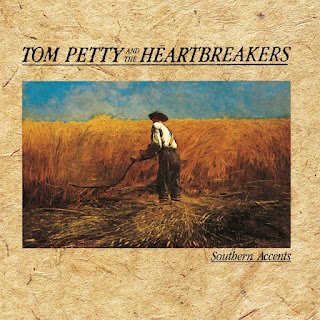This sets the stage for Southern Accents, Tom Petty’s Dixie born ‘n’ bred proclamation of Rebel pride. Petty is an artist whose style and influences are similar to those of Springsteen, so it should come as no surprise that Petty would develop a work such as Southern Accents. At its best, Southern Accents is adventurous, insightful, and reflective of the Southern experience. Petty takes more than a few risks, though, which makes this perhaps his most flawed work.
Tom Petty & the Heartbreakers’ Southern Accents
One of the chances that Petty takes is in his unlikely paring with Dave
Stewart of Eurythmics on three of the album’s nine cuts. Although Stewart
proved that he held a fine grasp of pop stylings during his stint with the
Tourists, you won’t find an inkling of this influence on these songs.
Stewart’s presence as co-producer and songwriting partner seems to force Petty
and the straight-rockin’ Heartbreakers into an unnatural mold. “It Ain’t
Nothin’ To Me” is the first of these collaborative efforts. Although
interesting, lyrically, the musical accompaniment is a confused, discordant
mish-mash of blaring horns and misused instruments. Trying to emulate a
Stax/Memphis feel on the song, Petty would have been better off asking Booker
T for advice … this is easily the worst song that Petty has ever recorded.
“Don’t
Come Around Here No More,” the initial single release and the second
collaboration, is a much better song. Petty’s talents take over, with
Stewart’s influence shading the performance only a bit (mostly with the
unusual addition of a sitar, it would seem). The lyrics are sparse and
tightly-edited, the music ethereal and Petty’s vocals brilliant. The third cut
done with Stewart, “Make It Better (Forget About Me),” is mere filler … easily
forgettable.
The strongest two songs on Southern Accents are
the two Confederate anthems: “Rebels” and the title cut, “Southern Accents.”
Petty illustrates that not everyone has forgotten (or forgiven) the insults
paid on the South over a hundred years ago; certainly not the legion of fierce
young men to whom fast driving and hard drinking help combat the day-to-day
grind of deadening, hard-ankle jobs. Generations have been born with
resentment burning in their blood, a fact easily recognizable to Florida-born
Petty: “even before my father’s father, they called us rebels, while they
burned our corn fields, and left our cities leveled, I can still feel the eyes
of those blue-bellied devils, when I’m walking ‘round at night through the
concrete and metal…”
Much of the South, now called the “Sun Belt,”
has become the new playground of the rich. More and more, as modern day
carpetbaggers try to remake the South in their image, from the “concrete and
metal” down to the destruction of Southern culture, Petty’s pride in his
heritage becomes a battle cry: “there’s a Southern accent, where I come from,
the young ‘uns call it country, the Yankees call it dumb, I got my own way of
talkin’, but everything is done with a Southern accent where I come from.”
Both
cuts are powerful statements, echoes of a mindset shared by artists and the
alienated in the rapidly-integrated (by Northerners) “New South.” The
remainder of the LP’s material is solid, TP-brand rock, including “Spike,” a
satirical poke at the nihilistic “punk” lifestyle and dress. Perhaps “Johnny
Reb,” in his gray uniform and proudly-worn “stars ‘n’ bars” was really the
original punk … the Civil War certainly did its part in creating an aura of
angst and frustration south of the Mason-Dixon line, long before
economically-bankrupt British youth rediscovered the feeling in ’76 and
imported the trend to the states, casting millions of bored, upper-crust youth
into a stylistic frenzy of strange hairdos and leather/chains/studs they
bought with father’s Visa card. Daddy’s little boys and girls needed only to
look into their own backyard to find the roots of this phenomenon.
The Reverend’s Bottom Line
Even with its flaws, Southern Accents is among one of the year’s
best … Petty’s artistic experimentation and the strongly-worded feelings
placed in these songs, though sometimes missing their mark, still represent
the most ambitious attempt since the landmark works of Lynyrd Skynyrd in
creating an identity and pride in Southern roots. (MCA Records, 1985)
Review originally published in the Summer 1985 issue of Anthem: The Journal
of (un)Popular Culture
Buy the CD from Amazon:
Tom Petty & the Heartbreakers’ Southern Accents


No comments:
Post a Comment